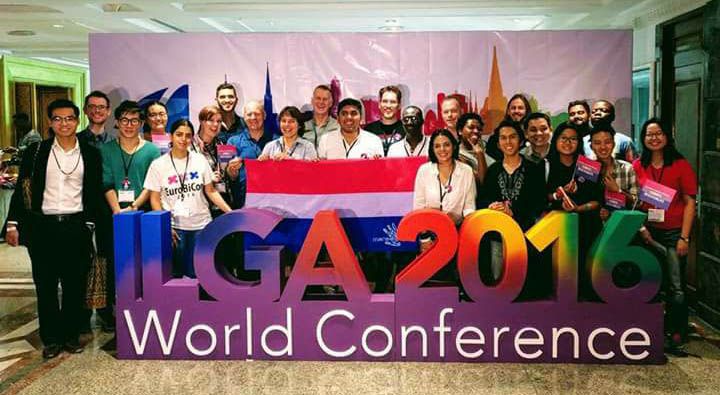By Misty Farquhar
After two overnight flights on a budget airline, I was feeling more than a little bit rough when I arrived in Bangkok in the early hours of Sunday, November 27. Still, my spirits were high in readiness for the week ahead at the 2016 ILGA World Conference. When I arrived at the Sukosol Hotel, it was clear this would be a reasonably comfortable immersion for me. From the jam-packed program to the careful matching of roommates, a great deal of care had obviously gone into organising the most significant event in the LGBTI rights calendar.
ILGA (The International Lesbian, Gay, Bisexual, Transgender, and Intersex Association) is an enormous memberbased organization with global reach. Although it started out almost 40 years ago as a Eurocentric gay rights organization, it now has chapters in six regions and is inclusive of all rainbow identities. At the organization’s 28th global conference, almost 700 activists from over 100 countries came together to discuss contemporary issues impacting LGBTI people around the world.
As an Australian researcher and activist with a particular interest in all things non-binary, I was very keen to learn more about the dialogue on these less visible issues outside of my faraway home. I certainly wasn’t disappointed, as there was trans and intersex content woven throughout the conference, and a seemingly new focus on bisexuality. In particular, the first ever Bisexual Secretariat was established, with newly appointed representatives Frank Evelio Arteaga (Manodiversa, Bolivia) and Hilde Vossen (LNBi, Netherlands) taking the lead.
A full-day pre-conference was scheduled, dedicated to developing a global agenda for the Bisexual Secretariat to work toward with the support of ILGA. Representatives were also invited to discuss the unique issues affecting bi people with Vitit Muntarbhorn, the newly appointed inaugural Independent Expert on Sexual Orientation and Gender Identity for the United Nations. And behind the scenes, Hilde worked tirelessly to build connections with bisexual activists from around the world, who will contribute to the development of the Secretariat going forward.
The highlight of the entire conference for me was the bisexual pre-conference. After an intensive day of presentations and workshopping with over 50 activists and allies from around the world, four main recommendations from the bisexual preconference were reported back to the ILGA Word Board:
VISIBILITY: Acknowledgement that a substantial number of people are attracted to more than one gender, and that bisexuals want to be equally visible in ILGA’s work.
HUMAN RIGHTS: Acknowledgement that bisexuals are also suffering from laws which criminalize same-sex sexual conduct, and face extra burden because legal systems around the world do not understand bisexuality.
RESEARCH: Support for more research on bisexuality, particularly in understudied regions and populations, and involvement of the bisexual community in research design to be sure bisexual data is captured.
GLOBAL FUND: Make arrangements for foundations and charities working on LGBTI issues to establish specific funds for working on bisexual issues.
Of course, none of the recommendations reported back to the ILGA World Board will be new to bisexual activists. Hilde confirmed that, “The work we will do as the Secretariat will be similar to the work we all already do in our own regions, but for the first time it will be approached on a global scale.” But the discussion and shared understanding resulting from this forum was invaluable.
Of these recommendations, visibility is still considered to be the priority issue by many activists. Zeynab Peygham-barzadeh (Spectrum, Iran) said, “I think invisibility is still our main problem, and promoting an inclusive non-binary language should be our main task.” This was somewhat evident in the main conference, which had minimal bisexual content and plenty of non-inclusive language. However, there is hope that the remit of the Bisexual Secretariat will result in a dramatic improvement in this area at the 2018 conference in Wellington, New Zealand.
For me and for many others, the conference was an important time to connect and renew our passion. Sally Goldner (Bisexual Alliance Victoria, Australia) said that networking with other bisexual activists was the highlight of the conference for her. “I felt more connected at this conference than at conferences in Australia, where overall I know more people.” And I have to agree; there can be a certain sense of isolation in bisexual activism even within the LGBTI community.
While there may still be some hurdles to overcome (for example, Frank and Hilde do not speak the same language), events like this should give all of us the strength and solidarity to continue working in the face of adversity. Now more than ever, the LGBTI community needs to continue to focus on collective impact: globally, regionally, and nationally. And bisexual activists must be a part of that.
FOOTNOTE: Following the ILGA World Conference, Vitit Muntarbhorn held a public consultation at the United Nations offices in Geneva on 25 Jaunary 2017. A small number of bisexual activists were able to attend, with Hilde Vossen once again taking the role of spokesperson. Footage of her speech can be viewed at https://www.youtube.com/watch?v=o0oeomx3d4I from 2:07:40.
Misty is a proud non-binary bisexual and passionate advocate for inclusion. Misty has a Master’s in Human Rights, a Bachelor of Psychology, and an adorable little brown dog for keeping it real.

